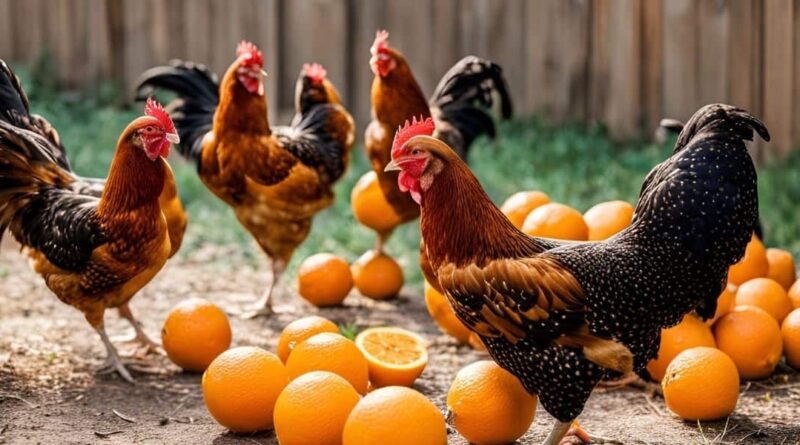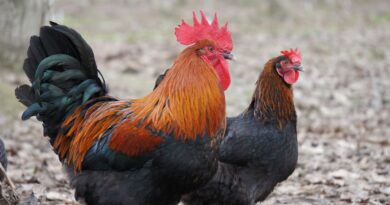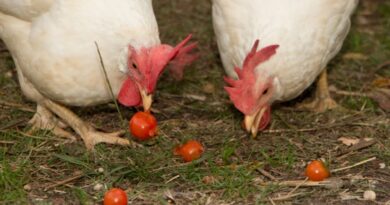Can Chickens Eat Oranges? Benefits, Risks, and Feeding Tips
Chickens are resilient creatures with varied dietary preferences, but as responsible poultry keepers, understanding what is safe and nutritious for them is essential. One common question is, “Can chickens eat oranges?” The short answer is yes, but with some caveats. This article explores the benefits, risks, and feeding tips to ensure your flock enjoys oranges safely.
Can Chickens Eat Oranges?
Yes, chickens can eat oranges, but in moderation. Oranges are packed with nutrients like vitamin C, fiber, and natural sugars, making them a potentially healthy treat. However, their high acidity means they should not form a significant portion of a chicken’s diet.
Nutritional Value of Oranges for Chickens
Oranges are nutrient-dense fruits that offer several health benefits. Here’s a breakdown of the key nutrients found in oranges:
- Vitamin C: Boosts immunity and helps reduce stress in chickens, especially in extreme weather conditions.
- Fiber: Aids in digestion and keeps the gut healthy.
- Natural Sugars: Provides a quick energy source.
- Potassium: Supports muscle function and overall health.
- Antioxidants: Help fight free radicals and improve overall well-being.
Benefits of Feeding Oranges to Chickens
When given in moderation, oranges can provide several advantages:
1. Boosts Immunity
The high vitamin C content strengthens the immune system, making chickens more resilient to diseases. This is particularly beneficial during stressful periods like molting or extreme weather.
2. Hydration
Oranges have a high water content, which helps keep chickens hydrated, especially during hot summer months.
3. Improves Egg Quality
The nutrients in oranges can contribute to healthier, more robust eggshells and potentially enhance the nutritional profile of the eggs.
4. Variety in Diet
Introducing oranges adds variety, which can prevent boredom and encourage natural foraging behavior.
Risks of Feeding Oranges to Chickens
While oranges are safe, there are some risks to consider:
1. High Acidity
Oranges are acidic, and excessive consumption may upset a chicken’s digestive system, leading to diarrhea or reduced calcium absorption, which can affect eggshell quality.
2. Overconsumption of Sugar
The natural sugars in oranges can lead to weight gain and metabolic issues if fed excessively.
3. Pesticide Residue
If not washed properly, oranges may contain pesticide residues, which can harm chickens.
4. Potential Waste
Chickens may not eat the orange peels, leading to food waste and attracting pests like rats or insects.
How to Feed Oranges to Chickens Safely
To ensure your chickens enjoy the benefits of oranges without the risks, follow these feeding tips:
1. Wash Thoroughly
Before offering oranges, wash them well to remove any pesticides or chemicals from the surface.
2. Peel the Oranges
While chickens can peck at orange peels, most prefer the flesh. Removing the peel can reduce waste and make the fruit easier to eat.
3. Cut into Small Pieces
Cut the orange into bite-sized pieces to prevent choking and make it easier for chickens to peck at.
4. Offer in Moderation
Treat oranges as an occasional snack. A few pieces once or twice a week are sufficient for a small flock.
5. Combine with Other Foods
Mix orange pieces with other treats like leafy greens or grains to balance the diet and reduce the impact of acidity.
6. Observe Your Flock
Monitor how your chickens react after eating oranges. If they show signs of discomfort or diarrhea, stop feeding them oranges.
Alternative Fruits for Chickens
If oranges don’t work well for your flock, consider other fruits that are safe and nutritious for chickens:
- Apples: Remove seeds and offer in slices for a crunchy treat.
- Bananas: Rich in potassium and easy for chickens to eat.
- Berries: Blueberries, strawberries, and raspberries are low in sugar and packed with antioxidants.
- Melons: Watermelon and cantaloupe are hydrating and full of nutrients.
- Grapes: Provide a sweet and easy-to-eat snack, but cut them in half to prevent choking.
Foods to Avoid Feeding Chickens
While oranges are generally safe, some foods should never be fed to chickens:
- Avocado (pit and skin): Contains persin, which is toxic to chickens.
- Chocolate: Theobromine in chocolate is harmful to poultry.
- Onions and Garlic: Can affect egg taste and cause digestive issues.
- Raw Beans: Contain harmful lectins that can be fatal to chickens.
- Moldy or Rotten Food: Can cause severe health issues.
Signs Your Chickens Enjoy Oranges
Chickens will make it clear if they like oranges. Look for these behaviors:
- Pecking enthusiastically at the orange pieces.
- Finishing the treat quickly without leaving much behind.
- Increased energy or playful behavior after consuming oranges.
How Oranges Fit into a Balanced Chicken Diet
Oranges are a treat and should not replace the core components of a chicken’s diet. A balanced diet for chickens includes:
- Layer Feed: The primary source of nutrients, formulated specifically for laying hens.
- Vegetables and Greens: Leafy greens, cucumbers, and carrots add variety and nutrition.
- Protein Sources: Mealworms, scrambled eggs, or yogurt for extra protein.
- Grains: Scratch grains or cracked corn for energy.
- Clean Water: Ensure constant access to fresh water.
Treats like oranges should comprise no more than 5-10% of their overall diet.
Frequently Asked Questions About Chickens and Oranges
1. Can baby chicks eat oranges?
Baby chicks have sensitive digestive systems and should not be given oranges. Stick to chick starter feed until they are at least 8 weeks old.
2. Can chickens eat orange peels?
Chickens can eat orange peels, but they may find them tough and less appealing. Additionally, the peels can contain pesticides if not washed thoroughly.
3. Do oranges affect the taste of eggs?
Feeding oranges occasionally should not impact egg flavor. However, consistently feeding highly aromatic or acidic foods could influence the taste over time.
4. Can chickens eat other citrus fruits?
Yes, chickens can eat other citrus fruits like lemons, limes, and grapefruits, but they should be offered sparingly due to their high acidity.
Final Thoughts
Can chickens eat oranges? Absolutely, but moderation is key. Oranges can be a nutritious and refreshing treat for your flock, offering benefits like hydration and immune support. However, their acidity and sugar content mean they should not replace the main components of a chicken’s diet. By following the feeding tips outlined in this article, you can safely introduce oranges into your chickens’ diet and keep your flock happy and healthy.




